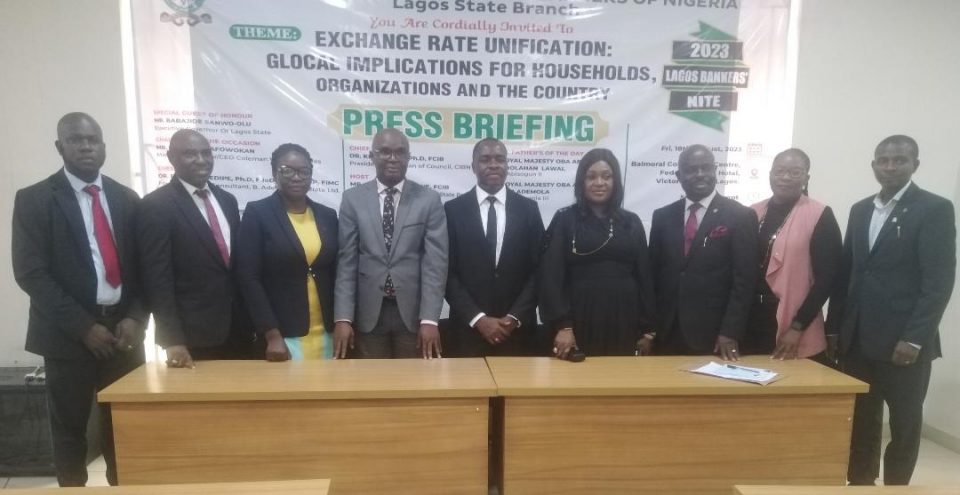Photo caption:
From left: Mr Jimoh Osabiya FCIB, Financial Secretary; Mr. Oyelayo Adekanye FCIB, General Secretary; Mr. Adeoye Adeyemo FCIB, Chairman, CIBN, Lagos; Dr. (Mrs) Abosede Ogundimu, FCIB, 2nd Vice Chairman; Nze Robert Nnaji FCIB, Treasurer and Mr. Kunle Adefunwa FCIB, Branch Comptroller, at the press briefing announcing the Bankers Nite of the Chartered Institute of Bankers, Lagos Branch, in Yaba, Lagos on Tuesday.
*Experts lament
By Uchendu Amuta
The decision by the federal government to allow free floating of the country’s currency, the Naira, to demand and supply, has received hard knocks from experts who described the policy as hasty and not sustainable for the nation’s economic development.
They questioned the rationale behind the APC led government on why it should allow important economic variables as the removal of fuel subsidy and Naira floating happen at same time without first putting up measures that could cushion the effects. They warned that Nigerians may be in for more bitter hardship should government not urgently have a second look at the policy and its effects.
The Chartered Institute of Bankers of Nigeria (CIBN), Lagos State Branch, stated that allowing the free float of the naira to demand and supply is not sustainable for Nigeria’s quest for achieving economic growth.
In a press conference to herald its 2023 Lagos Bankers Nite themed “Exchange rate unification: Glocal implications for households, organisations and the country” scheduled to hold on the 18th of August, 2023, the Branch Chairman, CIBN Lagos State Branch, Mr. Adeyemo Adeoye, said rather than allow a free floating of the naira to demand and supply, government would have adopted what he termed as “managed floating.” He warned that the free floating model would make the naira less effective since the model is basically based on speculations.
According to him, prior to the unification policy, the difference between the official and parallel market was about N20 which he said has risen to over N200.
“In other climes, they reduce the supply of currency in the nation by increasing the reserve ratio of banks. Naturally, you will see the impact on the value of the currency, but we have a peculiar economy here where the rate between the parallel market and the official market averages about 80 per cent while it is 5 per cent in other developed economies,” he said.
He, however, urged the Tinubu-led administration to look inward by prioritising investment to boost the nation’s productive sectors.
Speaking on the Bankers ‘ Nite, he said the annual event has over the years been an epitome of social gathering for high profile bankers in Lagos state, financial industry leaders, key stakeholders in the Nigerian economy, captains of industries and topmost opinion leaders in the society.
He said: “It is an annual event where major financial policies are reviewed and, new focus articulated. With well over 500 high profile banking/financial practitioners and other Institutions in attendance, the 2023 Lagos Bankers’ Nite provides an ample avenue for effective networking and a platform for collating and aggregating ideas that could form key inputs that can help the government navigate the prevailing exchange rate management process.
“As one of our significant stakeholder, with whom we have formed key partnership with over the years, we want to encourage you to give this event maximum publicity and mentions, so that more Nigerians can benefit from this important event in view of the current economic situation.”




